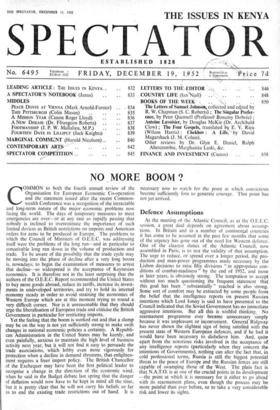Defence Assumptions At the meeting of the Atlantic Council, as
at the O.E.E.C. session, a great deal depends on agreement about assump- tions. In Britain and in a number of continental countries it has come to be assumed in the past few months that some of the urgency has gone out of the need for Western defence. One of the clearest duties of the Atlantic Council, now assembled in Paris, is to test the validity of that assumption. The urge to reduce, or spread over a longer period, the pro- duction and man-power programmes made necessary by the Lisbon decisions to raise fifty divisions " in appropriate con- ditions of combat-readiness " by the end of 1952, and more in later years, is obviously strong. The temptation to accept without too much questioning the frequent statement that this goal has been " substantially " reached is also strong. Some sort of comfort may be extracted by some people from the belief that the intelligence reports on present Russian intentions which Lord Ismay is said to have presented to the Council indicated that the Soviet Government has no immediate aggressive intentions. But all this is wishful thinking. No rearmament programme ever became unnecessary simply because it was unpleasant or inconvenient. General Ridgway has never shown the slightest sign of being satisfied with the present state of Western European defences, and if he had it would have been necessary to disbelieve him. And, quite apart from the notorious risks involved in the acceptance of any intelligence reports (particularly when they concern the intentions of Governments), nothing can alter the fact that, in cold professional terms, Russia is still the biggest potential threat to the peace of Europe and the Russian forces are still capable of swamping those of the West. The plain fact is that N.A.T.O. is at one of the crucial points in its development —the point at which it is necessary for it either to go ahead with its rearmament plans, even though the process may be more painful than ever before, or to take a very considerable risk and lower its sights.


































